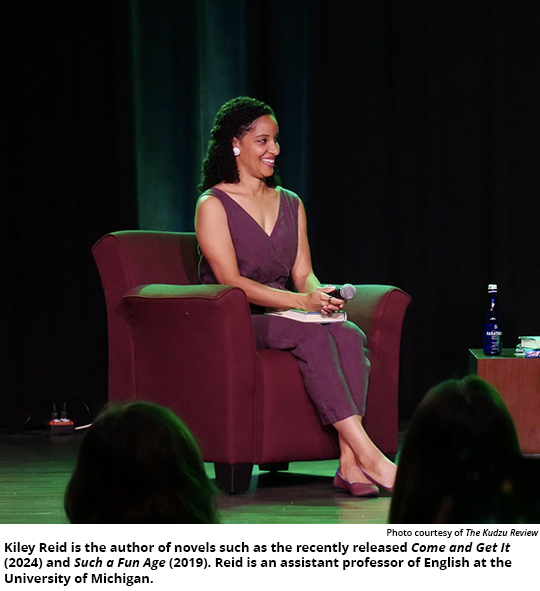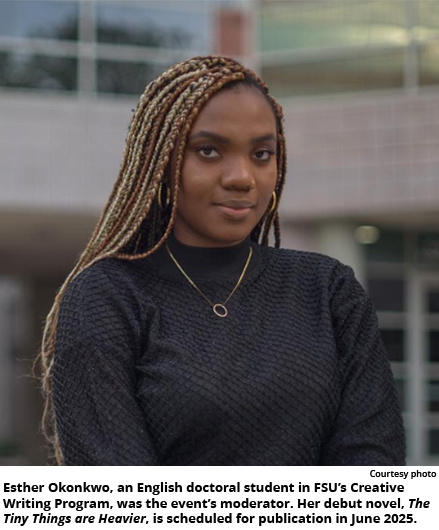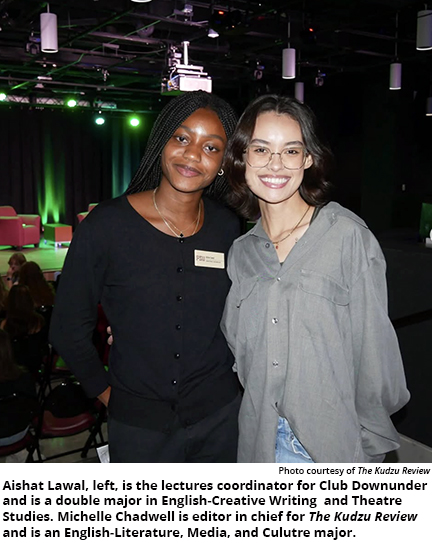Recent lecture at Club Downunder gave English major greater perspective on diverse and engaging campus opportunities
By Emily Wilmot
Being an undergraduate student at Florida State University, I have been to a few social events at Club Downunder, but a Fall 2024 lecture was my first time at an academic-focused night.
I was nervous walking into the campus venue, located in Oglesby Union, primarily because I attended by myself, but also, I was unsure of what to expect. In my head, I imagined a familiar type of scholarly lecture, where a professor or instructor stands at the front of the class, explaining to students what they need to know for their project or test.
The ambiance inside completely broke up those ideas. Couches sat on the stage, which made the event feel more conversational. As if two friends were about to sit down to discuss the latest book they read, gossiping about the characters and drama.
The dim, green lighting and darkened surroundings were comforting. Those elements also pulled my attention toward the bright spotlights on the stage and prevented me from being distracted by decorations or movement. I almost felt like I was preparing for the poetry slam in An Extremely Goofy Movie, where the atmosphere was quiet, respectful, and focused.
Once the clock hit 8 p.m., Aishat Lawal, the lectures coordinator at Club Downunder, and Michelle Chadwell, the editor in chief of The Kudzu Review, took the stage and introduced the moderator with a warm welcome.
Then, the featured speaker, Kiley Reid, walked out.
My first impression of Reid was the bright smile on her face as she came out. She seemed put together and I thought her earrings were so fun. Reid is the author of the recently released Come and Get It and Such a Fun Age, published in 2019.
Her time as a writer has created a well of knowledge, which she encouraged people to take from, highlighted by her excitement to share advice during the lecture.
She held an incredibly unique perspective on the writing and research processes. Part of what stuck out to me was her commitment to detailed research instead of pulling entirely from her life experiences. Her demeanor indicated she was someone who was easy to talk to.
“She is so, so pleasant,” Lawal said in an interview following the talk. “Honestly, as the coordinator, you really only get the duration of the event to talk to the talent, but she was so nice. Even the hospitality coordinator who picked her up from the airport and drove her to the hotel said, ‘She's so nice.’”
 Esther Okonkwo, an English doctoral student in Florida State University’s Creative Writing Program, was the event’s moderator. She is a teacher and a writer herself. Her debut novel, The Tiny Things are Heavier, is scheduled for publication in June 2025. She stood out in her role because of her familiarity with Reid and her work.
Esther Okonkwo, an English doctoral student in Florida State University’s Creative Writing Program, was the event’s moderator. She is a teacher and a writer herself. Her debut novel, The Tiny Things are Heavier, is scheduled for publication in June 2025. She stood out in her role because of her familiarity with Reid and her work.
“Kylie and I attended the same master’s program, the Iowa Writers Workshop,” Okonkwo said. “She was a year ahead of me, but it was really nice that we got to reconnect. She's also a brilliant writer and a really nice person to talk to.”
Many of the questions for Reid, both from Okonkwo and the students in the audience, were about how she writes, and Reid provided in-depth and engaging answers.
“I really liked her describing her process,” Lawal said. “Hearing her and the moderator describe their experiences with how they start the writing process and what it looks like for them really helped me realize that it's different for everyone.
“Whatever makes the process most enjoyable for you is the right way to do it. There is no clear-cut path to take.”
Okonkwo hoped the students in her classes who attended took away a bit of guidance to keep themselves strong throughout a big project.
“I wanted them to come and hear the message of the struggle and know that it's not all that big—it does get better,” she said. “If you keep at it, you will be read. If you keep at it, you will make yourself proud. Kiley talked about how when she is writing early on, she struggles through the process, but just having faith and just continuing to enjoy the process of writing, is the thing that keeps her afloat while she waits to get validation from everyone else.
“Validating herself first, validating yourself first, is important.”
Okonkwo and the audience also found the advice Reid had tucked into the Notes app on her phone to be entertaining.
“She had this list I was very interested in, things to know about when you're in college that she did not know. I think that was so funny and so useful,” Okonkwo said. “I'm a Ph.D. student, but I thought, ‘Okay, I think I need this too.’”
Along with the other students, Lawal stayed tuned in and entertained during Reid’s reading of her tips.
“I've gone to a couple events like this, but I've never seen someone actually have a list of advice that they read out,” Lawal said. “I’m happy she had something concrete since that's not something that I feel like lecturers often do, and it helped.”
Lawal chose Reid for this lecture because of her gender and her willingness to tackle topics other people may shy away from, such as money or class.
“I really wanted to make sure that I stayed away from the white male archetype,” Lawal said. “Even though there are so many amazing white male writers, I feel like everyone knows that already. Black female authors are such a rarity, especially ones that break out into the mainstream.
“I was so happy that we landed on Kylie, because I felt like it was a chance to bring someone who people might not know about and give everyone an opportunity to hear from her, in her own words, for free.”
Lawal is an FSU sophomore, earning dual degrees in English-Creative Writing and theatre studies. She started with Club Downunder as a programming intern, and she has worked her way up to lectures coordinator.
“I love my position so much; it really is rewarding,” she said. “Just being able to be the one who gets to pick the people that I bring and knowing that everything I do is because I want to, really helps me stay motivated and passionate.”
The work is mostly clerical, she added, but through the position she has been able to make connections and practice networking on an entirely different level.
“So much of the position involves you talking with higher ups, such as faculty or agents who are full time workers all around the nation,” Lawal said. “It helps a lot with professional development in terms of making you a well-rounded person, and being able to communicate eloquently and professionally.”
Lawal found a connection to Reid’s Such a Fun Age through her character’s navigation of white spaces.
“Being a sophomore at a predominantly white institution, that is something that I feel like I'm constantly having to do,” she explained. “Just to see one person's experience of it helped contextualize the way that I traverse these different obstacles and hurdles in life. It was nice to see someone else doing it, because I feel like I don't have a lot of peers who are in similar situations as me.”
Chadwell also felt personally affected by Reid’s lecture, particularly in the author’s discussions of money, a topic pulled from Come and Get It.
“As someone who understands the financial struggles of pursuing higher education as an immigrant, it was incredibly insightful and validating to see that represented by an acclaimed author,” said Chadwell, who is a senior English-Literature, Media, and Culture major. “It felt like she held my hand and told me that it’s valid to have a hard time, there are forces that make it so, and there is only so much you can do as one person to overcome it all.”
Chadwell, who contributed time and effort to the program, was Lawal’s main point of contact for the collaboration between the CDU and The Kudzu Review. The two worked closely together, reaching out to different potential authors and agencies for the event. Chadwell also collaborated with Midtown Reader to have copies of Kiley Reid’s novels for sale.
Chadwell also secured Okonkwo as the moderator, and she was an excellent choice. Okonkwo’s teaching and writer experience helped her to form thoughtful questions geared toward Reid’s content and the students in the audience. She zeroed in on young people because both Okonkwo and Reid teach young adults, who have become the center of their own writing.
“I liked the talking points about college students and those in their early 20s. I found my early 20s to be so chaotic,” Okonkwo said. “We really ignore young people, as a society. You’re thrown into this world of adulthood, and people simultaneously want you to be an adult but not treat you like one.”
The younger generation, she added, carries a great responsibility to learn new things and how to be an adult in a world that does not wait for them to do so.
“Often, because of that, you make a lot of mistakes as a human being,” she said. “We had a conversation about that during the event, and how the help is there for young people.”
Okonkwo’s investment in the development of young individuals is evident in her own upcoming publication, The Tiny Things are Heavier.
“It’s a coming-of-age story about this young girl who moves from Nigeria to the U.S. to get her master’s degree in English,” she said. “It is about trying to find oneself as a young person and trying to define yourself and your relationship with the world. It is also part immigrant story and part dysfunctional story because she must navigate the intricacies of finding herself while also holding on to familial love which can be difficult because she comes from a complicated family.”
Exploration of coming-of-age stories is important for younger audiences, especially those that deviate from focusing on white individuals, journeys already widely covered in novels. Okonkwo made sure to highlight those topics in her conversation with Reid because diverse voices are important for FSU’s campus, she said.
“Kiley Reid’s works give us narratives that resonate with underrepresented experiences,” Chadwell said. “Her novels address issues of race, class, privilege and interpersonal dynamics. Her presence fostered a platform for discussing and engaging with these themes. Perhaps her lecture inspired aspiring writers to explore their own voices and stories, knowing that there is a space for diverse perspectives in literary and academic spaces.”
Club Downunder often provides a space for different topics and levels of events. Programs consist of music events, standup comedy, fandom nights, and many other engaging options. Events at the CDU or at other campus venues, either academic or for fun, are for you to invest in yourself, and they are almost always free for students.
I encourage you to check them out because being around other creatives or people with a similar interest may encourage you to step out of your comfort zone and learn something new. Go with friends, or do what I did, and go by yourself. Regardless, you are bound to have a wonderful time.
Emily Wilmot is an English-Editing, Writing, and Media major, with a minor in economics.
Follow the English department on Instagram; on Facebook; and on X.
